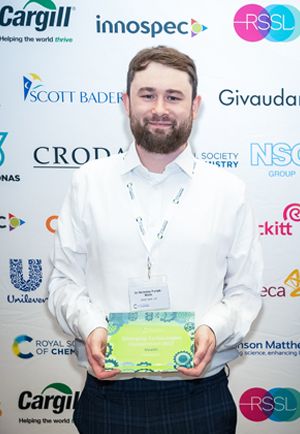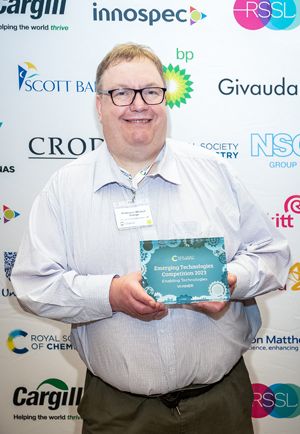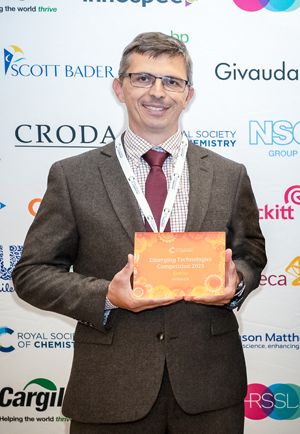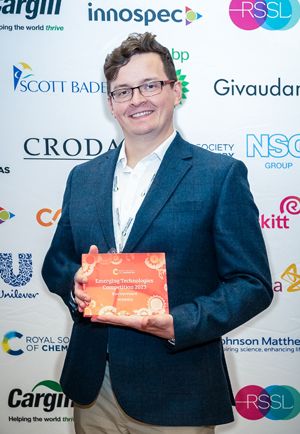A streamlined approach to diabetes management was one of the four winners at the Royal Society of Chemistry’s tenth annual Emerging Technologies Competition. It was among innovators in the spheres of food production, manufacturing and water pollution in winning a shared pot of £100,000, no strings attached.
NIQS Tech, the University of Nottingham, Lambda Energy and Mode Labs Limited took the top spots in the categories of Health, Enabling Technologies, Energy and Environment with solutions to the problems of diabetes management, synthetic manufacturing, food insecurity, and water pollution.
Some 24 shortlisted projects competed to wow a panel of industry heavyweights from the likes of Unilever, AstraZeneca and Givaudan in yesterday’s final.
NIQS Tech’s innovative sensors that can measure glucose levels without drawing blood or breaking the skin barrier came first in the competition’s Health category. The spin-out company, from the University of Leeds, created a simplified approach to glucose measurement using sensors that can measure glucose levels with just the tap of a finger.
NIQS Tech’s CEO, Nicholas Furtak-Wells, said: “It’s been a long journey to get to where we are now. But having the support of the Royal Society of Chemistry is incredible. I think access to the network of experts is really going to help us take the next steps to take this technology to market.”
In the Enabling Technologies category, the University of Nottingham’s continuous-flow Vortex Reactor, which aims to simplify the manufacturing process of synthetic materials, took first place. The technology will help to minimise the use of solvents, which are harmful to humans, animals and plants, as well as the use of other toxic chemicals.
“We’re absolutely thrilled to obtain this award for the University of Nottingham, but really it’s for the whole team of chemical engineers, mechanical engineers, and physicists that have achieved this,” said Professor Michael George of Nottingham Vortex. “It’s been a huge effort to try and make new technology that can make a huge difference not just in manufacturing, but also in making progress towards achieving net zero in the future.”
Lambda Energy, which develops light changing materials for boosting the power output of solar panels and increasing the crop yield in greenhouses, won the Energy category with a product that could boost farmers’ production by 20 per cent. The company’s Passive Light Management for Greenhouse Horticulture greenhouse coatings are used to increase the amount of red light available to plants, increasing crop yield without the need for electricity.
Boris Breiner, Chief Scientist at Lambda Energy, said: “Winning the Emerging Technologies Competition in the energy category to us means that we have a seal of approval from a very, very prestigious body - the Royal Society of Chemistry. That’s just a fantastic feeling to have and from a more practical point of view, the money helps.”
With water pollution a top concern for the UK and globally, it's little surprise that Mode Labs Ltd. took the top spot in the competition’s Environment category. The company’s scalable and easy to deploy water pollution sensors would make monitoring and controlling water pollution much easier.
“The recognition from such a prestigious institution is going to help us massively in a field where partnerships are key—forming partnerships with all of our collaborators and potential customers within the water sector is vital to what we do,” said Dean James, CTO of Modelabs Ltd.
In its tenth year, RSC CEO Dr Helen Pain said the competition was “more important than ever,” with “chemistry-led innovations playing a vital role in tackling societal challenges. supporting a sustainable future and driving economic growth.”
“The Emerging Technologies Competition was started in 2013 to celebrate the very best of chemical science innovation, catapult exciting ideas towards commercialisation, and raise the profile of often overlooked solutions to society’s biggest challenges,” she said.
“Ten years on, it’s more important than ever that we celebrate and encourage advances in technologies and innovative companies to chase their ambitions and turn their ideas into successful businesses.
“The volume of entries from early-stage start-ups, spin-outs and academic entrepreneurs across the four categories has proven how chemistry-led innovations are playing a vital role in tackling societal challenges, supporting a sustainable future and driving economic growth.”

















